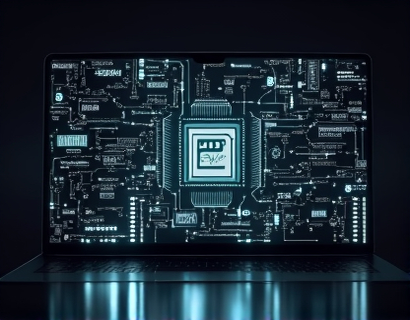Revolutionizing Privacy: Advanced Pseudonym Software for Secure Blockchain and AI Operations
In an era where digital privacy and security are paramount, the need for sophisticated tools that ensure anonymity and compliance in blockchain and AI operations has never been more critical. This article delves into the cutting-edge software solutions designed to create and manage secure pseudonyms, enabling users to engage in anonymous and compliant digital transactions and interactions. These advanced tools are meticulously crafted to address the complex requirements of privacy-conscious tech users in the blockchain and AI space, offering unparalleled security and seamless integration.
Understanding Pseudonymization in Blockchain and AI
Pseudonymization is the process of replacing personally identifiable information with artificial identifiers, or pseudonyms. In the context of blockchain and AI, this technique is crucial for maintaining user privacy while still allowing for the utilization of data and services. By using pseudonyms, individuals can participate in decentralized networks and AI-driven applications without exposing their real identities. This approach not only enhances personal privacy but also helps in meeting stringent regulatory requirements such as GDPR and CCPA.
Key Features of Advanced Pseudonym Software
The software solutions in focus offer a comprehensive suite of features designed to ensure robust security and seamless integration. These include:
- Dynamic Pseudonym Generation: The software can create unique and unpredictable pseudonyms for each transaction or interaction, making it extremely difficult for adversaries to trace activities back to the user.
- End-to-End Encryption: All data transmitted using the pseudonyms is encrypted, ensuring that even if intercepted, the information remains unreadable and secure.
- Compliance Management: The platform is designed to adhere to various international privacy regulations, providing tools to manage consent, data access, and deletion requests efficiently.
- Integration Capabilities: Seamless integration with existing blockchain and AI systems, ensuring that the pseudonymization process does not disrupt current workflows.
- User Control and Transparency: Users have full control over their pseudonyms, including the ability to revoke or change them as needed, with clear logs and audits to maintain transparency.
Enhancing Security Through Advanced Algorithms
The security of pseudonymization relies heavily on the algorithms used to generate and manage pseudonyms. Advanced pseudonym software employs state-of-the-art cryptographic techniques to ensure that pseudonyms are both unique and resistant to reversal engineering. These algorithms include:
- Cryptographic Hash Functions: Utilizing hash functions like SHA-256 to create one-way transformations of user data into pseudonyms, ensuring that the original data cannot be retrieved.
- Public Key Infrastructure (PKI): Implementing PKI to manage digital certificates and public-private key pairs, adding an extra layer of security to the pseudonymization process.
- Zero-Knowledge Proofs: Incorporating zero-knowledge proofs to verify the authenticity of transactions without revealing any additional information about the user or the data.
These advanced cryptographic methods collectively ensure that pseudonyms are secure and that the risk of identity leakage is minimized.
Meeting Regulatory Compliance
One of the most significant challenges in the digital age is adhering to a myriad of privacy regulations. Advanced pseudonym software is designed to simplify compliance by providing built-in tools and features that address the requirements of various regulations. For instance:
- GDPR Compliance: The software includes mechanisms to manage user consent, data portability, and the right to be forgotten, aligning with GDPR standards.
- CCPA Compliance: It offers tools to handle California residents' requests for knowing, deleting, and opting out of the sale of personal information.
- Data Minimization: By using pseudonyms, the software ensures that only necessary data is collected and processed, adhering to the principle of data minimization.
These features not only help organizations avoid hefty fines and legal issues but also build trust with users who are increasingly concerned about their privacy.
Seamless Integration and User Experience
For the software to be truly effective, it must integrate smoothly with existing blockchain and AI systems. Advanced pseudonym solutions are designed with this in mind, offering:
- API Support: Comprehensive APIs that allow for easy integration with various blockchain platforms and AI frameworks, ensuring a smooth transition without disrupting current operations.
- User-Friendly Interface: An intuitive dashboard that simplifies the management of pseudonyms, making it accessible even to users with limited technical expertise.
- Real-Time Monitoring: Tools to monitor and audit pseudonym usage in real-time, providing insights and alerts for any suspicious activity.
This level of integration and user-friendliness ensures that organizations can adopt the software without significant downtime or complexity.
Use Cases and Applications
The applications of advanced pseudonym software are vast and varied, catering to different sectors within the blockchain and AI ecosystem. Some key use cases include:
Decentralized Finance (DeFi)
In DeFi, pseudonymization allows users to participate in lending, borrowing, and trading without revealing their true identities. This enhances security and reduces the risk of fraud, making DeFi more accessible and appealing to a broader audience.
Supply Chain Management
In supply chain applications, pseudonyms can be used to track products and transactions without exposing sensitive information about suppliers or customers. This ensures compliance with privacy laws while maintaining transparency and traceability.
Healthcare AI
In AI-driven healthcare solutions, patient data can be pseudonymized to protect personal health information while still enabling powerful analytics and personalized treatments. This balance between utility and privacy is crucial in the healthcare sector.
Social Media and Content Platforms
Social media and content platforms can leverage pseudonymization to allow users to share and interact without fear of their real identities being exposed. This promotes free expression while maintaining a level of anonymity and security.
These use cases demonstrate the versatility and importance of advanced pseudonym software in various industries, underscoring its role in shaping a more private and secure digital future.
Future Trends and Developments
The field of pseudonymization is rapidly evolving, driven by advancements in blockchain technology, AI, and privacy regulations. Some future trends to watch include:
- Quantum-Resistant Algorithms: As quantum computing becomes more viable, there will be a greater emphasis on developing pseudonym algorithms that can withstand quantum attacks.
- Decentralized Identity Management: The rise of decentralized identity solutions will further enhance the capabilities of pseudonym software, allowing users to control their identities across multiple platforms.
- Regulatory Harmonization: As more countries adopt privacy regulations, there will be a push for standardized pseudonymization practices that can be universally applied.
Staying ahead of these trends is essential for organizations looking to implement advanced pseudonym solutions, ensuring they remain compliant and secure in an ever-changing digital landscape.
Conclusion
Advanced pseudonym software represents a significant leap forward in digital privacy and security, particularly in the realms of blockchain and AI. By providing robust, compliant, and user-friendly solutions, these tools empower individuals and organizations to navigate the digital world with confidence. As the demand for privacy continues to grow, the importance of such software will only increase, making it an indispensable asset in the tech industry.










































